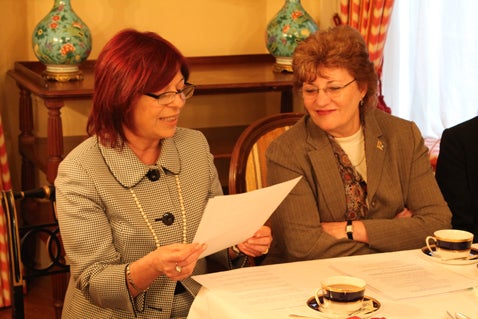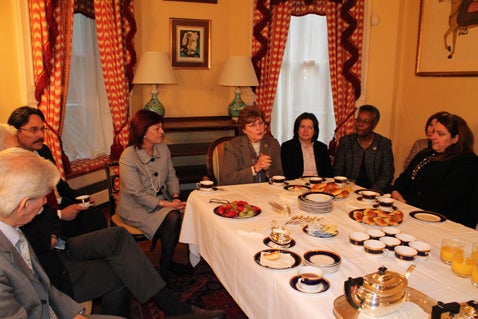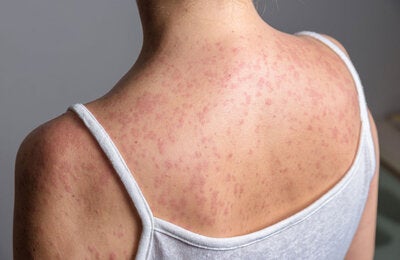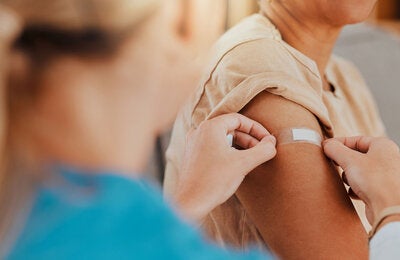

During her last official visit to United Nations headquarters as Director of the Pan American Health Organization (PAHO), Dr. Mirta Roses Periago was thanked by members of the Regional Group of Latin America and the Caribbean (GRULAC)...
 New York, New York, 14 December 2012 (PAHO/WHO) — During her last official visit to United Nations headquarters as Director of the Pan American Health Organization (PAHO), Dr. Mirta Roses Periago was thanked by members of the Regional Group of Latin America and the Caribbean (GRULAC) for her public health leadership during 10 years as PAHO Director.
New York, New York, 14 December 2012 (PAHO/WHO) — During her last official visit to United Nations headquarters as Director of the Pan American Health Organization (PAHO), Dr. Mirta Roses Periago was thanked by members of the Regional Group of Latin America and the Caribbean (GRULAC) for her public health leadership during 10 years as PAHO Director.
GRULAC representatives gathered to bid farewell to Dr. Roses, who ends her second term as PAHO Director on 31 January 2013, at a breakfast meeting hosted by Ambassador Maria Cristina Perceval, Permanent Representative of Argentina to the United Nations. Participants included Ambassador Dessima Williams, Permanent Representative of Grenada; Ambassador Jaime Hermida Castillo, Permanent Representative of Nicaragua; high-level officials from the U.N. Permanent Missions of Brazil, Chile, Colombia, Cuba, Honduras, Guatemala, Mexico, Trinidad and Tobago, and Uruguay as well as representatives of the Latin American and Caribbean (LAC) divisions of U.N. agencies including the United Nations Development Program (UNDP), the U.N. Population Fund (UNFPA) and UN Women.
Ambassador Perceval and other GRULAC representatives expressed "deep appreciation" for Dr. Roses's leadership of health development in the Americas and noted with gratitude her investment in increasing technical support in New York. Ambassador Perceval said Dr. Roses's career had had a positive impact at the national, regional and international levels.
Under Dr. Roses's leadership, PAHO's technical cooperation programs contributed to significant public health achievements in Latin America and the Caribbean, including reductions in maternal, infant, and childhood mortality. Dr. Roses said she hoped in the future to see further reductions in maternal mortality, noting the strong political commitment in the Americas to address this critical issue. She also warned that the Region's record of impressive gains in life expectancy might not be sustained in the next generation, due to increases in violence, in all its forms, and to the growing epidemic of non-communicable diseases (NCDs). These critical health themes are best addressed under the umbrella of universal health coverage, using a rights-based approach, she said.
Dr. Roses also described PAHO's contributions to efforts to eradicate cholera from Haiti and the Dominican Republic and emphasized the importance of investments in water and sanitation to prevent the introduction of cholera into other countries. Noting the potential negative impact on other countries' economies, especially in the Caribbean, she urged solidarity in fighting cholera on the island of Hispaniola, particularly in Haiti.

Dr. Roses praised GRULAC member countries for their health leadership, particularly in "placing health at the center of the political and development agendas within the international community." She cited as the most recent example the leadership of the Caucus of Caribbean Countries (CARICOM) in promoting the prevention and control of NCDs on the global development agenda. She also commended the regional directors of the LAC divisions of the U.N. agencies for their collaborative work in health and development.
PAHO will continue, as it always has, to promote and protect the well-being of the people of Latin America and the Caribbean, Dr. Roses promised. She encouraged all GRULAC ambassadors to continue to play a central role, working together and building on their countries' strengths and experiences, to place universal health care at the core of the post-2015 global development agenda.
Efforts to advance social protection in health and primary health care based health systems in LAC have resulted in more resilient health services that have protected people's lives during economic and political crises and during emergencies, and have been critical to ensuring faster recovery and growth. The 30 years of life expectancy gained by the Region in a century, in spite of persistent inequalities, is a clear testimony to the importance of social policies aimed at reducing poverty.
PAHO, which celebrates its 110th anniversary this year, is the oldest international public health organization in the world. It works with its member countries to improve the health and the quality of life of the people of the Americas. It also serves as the Regional Office for the Americas of the World Health Organization (WHO) and is part of the United Nations System.
Links:
- http://www.paho.org/paho110/
- http://www.paho.org
- https://www.facebook.com/PAHOWHO
- https://www.youtube.com/pahopin
- https://twitter.com/pahowho
- https://twitter.com/opsoms
Media Contacts:
Leticia Linn, linnl@paho.org, Tel. + 202 974 3440, Mobile +1 202 701 4005, Donna Eberwine-Villagran, eberwind@paho.org, Tel. +1 202 974 3122, Mobile +1 202 316 5469, Sebastián Oliel, oliels@paho.org, Phone +1 202 974 3459, Mobile 202 316 5679, Knowledge Management and Communications, PAHO/WHO—www.paho.org



